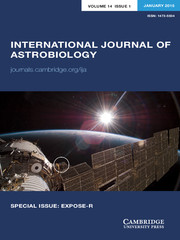Article contents
Testing evolutionary convergence on Europa
Published online by Cambridge University Press: 09 March 2004
Abstract
A major objective in solar system exploration is the insertion of appropriate biology-oriented experiments in future missions. We discuss various reasons for suggesting that this type of research be considered a high priority for feasibility studies and, subsequently, for technological development of appropriate melters and submersibles. Based on numerous examples, we argue in favour of the assumption that Darwin's theory is valid for the evolution of life anywhere in the universe. We have suggested how to obtain preliminary insights into the question of the distribution of life in the universe. Universal evolution of intelligent behaviour is at the end of an evolutionary pathway, in which evolution of ion channels in the membrane of microorganisms occurs in its early stages. Further, we have argued that a preliminary test of this conjecture is feasible with experiments on the Europan surface or ocean, involving evolutionary biosignatures (ion channels). This aspect of the exploration for life in the solar system should be viewed as a complement to the astronomical approach for the search of evidence of the later stages of the evolutionary pathways towards intelligent behaviour.
Keywords
- Type
- Research Article
- Information
- Copyright
- © 2003 Cambridge University Press
- 13
- Cited by


